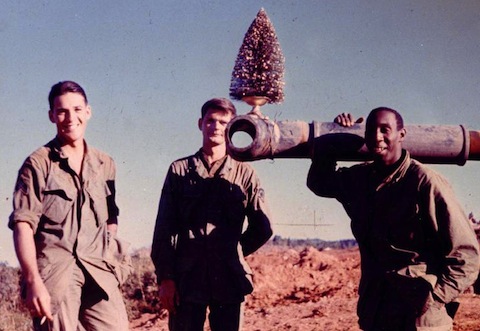
With roughly six months to go ’til my first book is due, you can expect plenty more research extras in the coming weeks. A lot of those posts will be designed to help me think through some of the slippery issues I’m encountering as I shape the central narrative—I’m still struggling to understand the mindsets and motivations of my two principal characters. There are few non-fiction challenges tougher than getting inside the head of someone whose logic doesn’t make sense at first blush.
One tangential story I’ve been contemplating quite a bit is that of Dwight Johnson, a Detroit native who won a Medal of Honor for his bravery at Dakto, Vietnam. Less than three years after receiving the hallowed award, he was killed while trying to rob a grocery store. Johnson’s motive for the crime will forever remain a mystery: He was either trying to get $25 to pay for a minor medical procedure for his wife, or so psychologically broken by his post-war experiences that he couldn’t help but lash out. What is known, however, is that he felt that the Medal of Honor was as much a curse as a blessing—it forever pegged him as someone special, when deep down he couldn’t understand why he had survived Dakto when so many comrades had perished. This heartbreaking New York Times account (PDF) of Johnson’s last months includes excerpts from his Army psychiatric evaluations that reveal his inner turmoil:
The subject remembered coming face to face with a Vietnamese with a gun. He can remember the soldier squeezing the trigger. The gun jammed. The subject has since engaged in some magical thinking about this episode. He also suffers guilt over surviving it, and later winning a high honor for the one time in his life when he lost complete control of himself. He asked: “What would happen if I lost control of myself in Detroit and behaved like I did in Vietnam?” The prospect of such an event apparently was deeply disturbing to him.
Reading the whole sad story of Johnson’s downward spiral, which has some eerily close parallels to the tale I’m cobbling together, I kept on thinking about the burden of heroism. All Johnson wanted was for life to return to “normal,” the way it was before he went to Vietnam, despite the fact that his version of “normal” was quite economically deprived. He never wanted to carry the war back home, but the bestowal of the Medal of Honor made it inescapable—he could scarcely walk five feet in Detroit without someone asking about Dakto. A nation’s earnest effort to hail his exceptional bravery was what caused him to come undone. Call it a textbook case of best intentions gone terribly awry.
(Photo of Dwight Johnson, at right, via Ray Smith)


Brian // Nov 1, 2011 at 10:23 am
Fascinating and tragic. I just finished reading “On Killing: The Psychological Cost of Learning to Kill in War and Society” by Dave Grossman. Grossman looks at the circumstances unique to Vietnam, both in combat and when soldiers returned to civilian life, that created what was really a massive mental health catastrophe. I love the phrase “carry the war back home” because it captures the burdensome quality of their experience. For a variety of reasons that Grossman explains, many soldiers found doing so was unavoidable.
Brendan I. Koerner // Nov 1, 2011 at 12:55 pm
@Brian: The psychological fallout of Vietnam is a major theme in the next book. I talk a lot about paranoia-inducing aspects of combat, such as the extensive use of booby traps, as well as the extensive conflicts between officers and the rank-and-file. One of my main characters was pretty adversely affected by his three tours in ‘Nam, and never got the psychiatric care he required.
Brian // Nov 2, 2011 at 10:07 am
Sounds very interesting. I look forward to it. One of the observations in “On Killing” is that Vietnam was the first war from which soldiers departed by airplane and often individually. Grossman argues that the journey home from war with one’s fellow soldiers provided a meaningful bridge between war and the return to civilian life. He writes that Britain decided to have soldiers travel back from the Falklands war by sea, when they could have just as easily flown them, to provide this experience.
The Catch | Microkhan by Brendan I. Koerner // Nov 2, 2011 at 10:10 am
[…] Piano Demon ← Where Do We Go Now? […]